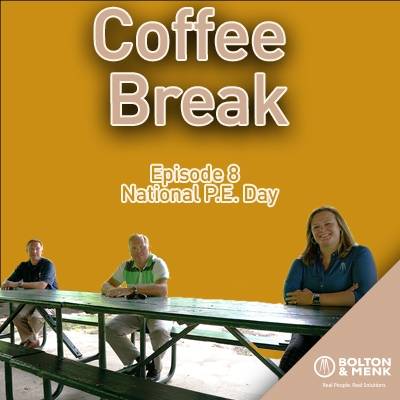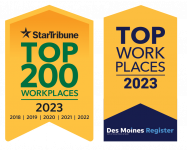
Coffee Break: National P.E. Day
To celebrate National P.E. Day, today’s Coffee Break is all about our professional engineers! We sat down with three P.E.s from our Willmar location to learn about their engineering journeys from as far back as the sandbox to where they are today.
Need a quick top-off of Coffee Break? Be sure to check out our YouTube channel to see the previous months’ videos. While you’re there, click that subscribe button to be among the first to see our newest releases.
JK: I was just going to say… cause you probably don’t want very long answers, I’m guessing, huh?
SK: We don’t need your whole history about the Twins’ stadium.
*All laugh*
Coffee Break Episode 8 – P.E. Day
SK: You can’t see it, but Justin’s holding a cheat sheet on his lap. *laughs*
Name and position at Bolton & Menk and how do you take your coffee?
JK: My name is Justin Kannas, and I’m a principal engineer and I like my coffee in a thermos mug because I sip on it all morning long and it has to be hot.
JH: I’m Josh Halvorson, I’m a principal engineer out of our Willmar office. I enjoy my coffee black, leaded, at least two cups in the morning, and probably at least one in the afternoon.
SK: I’m Sheila Krohse, I’m also a principal engineer in the Willmar office. I don’t drink coffee that often, but when I do, I like it super sweet.
Who or what inspired you to go down this career path?
JH: You know, my inspiration really started, back I would say maybe in the sandbox playing with tractors and bulldozers and backhoes. That really stemmed from my dad – he was a superintendent for a heavy equipment construction company, and he’d bring me to the job site. It led me to the answer of “well, why don’t you become an engineer to answer the little kids’ question of ‘why?’”. It kind of stemmed from that. If you have kids, you know, everyone’s always asking “well, why, daddy? Why is it like that?” The answer was to be an engineer.
JK: I’m sporting a Twins shirt here today. First of all, it’s home opener today, yay! Finally got baseball, so we’re happy about that! Second reason, though, is that’s actually part of my story. I grew up in Watertown, South Dakota and every summer, our big vacation was a big trip to the big city of Minneapolis to go watch a Twins game. Entering the big city, I was always inspired and kind of awe-struck by all the infrastructure. Just the network of bridges and tunnels and highways – that whole mesh network of the transportation system and skyscrapers and large buildings – it’s not something you see out in the cornfield in South Dakota every day. That was kind of the seed that got planted in me for being an engineer. I didn’t really think about it after that. I learned a little more about what engineering’s all about and thinking I could really be a part that, design that, and be involved in that. 23 years later, here I am. I’m a part of it and that’s just kind of cool – still is kind of cool. That’s kind of what was my inspiration.
SK: I come from a family of engineers. Growing up, my dad was a wastewater operator, Class A, and a public works director in the town we lived in. From there, I’m fairly confident he encouraged my oldest brother to go into engineering, and subsequently, my other two brothers and I all followed. It’s a great career. I watched my brothers go through it and what they were doing. I mean, they’re quite a bit older than me, so by the time I was getting into the college age, I saw what they were doing and I found it very interesting – to be able to help communities with their infrastructure needs and different things. I guess mine stemmed from my family.
JH: We’re editing this, right?
CB: No.
JH: Oh. *laughs*
SK: It is pretty fun though; my kids ask a lot of questions already.
What has been the most rewarding part of being a P.E. For you?
SK: I don’t know about being a P.E., but helping my clients. I’ve had a lot of issues in some of my client cities lately where there’s near catastrophic infrastructure failure and to be able to work with them and our funding group and we’ve managed to get millions of dollars in grants for some of these small cities that can’t otherwise afford to do this stuff – they have infrastructure that’s literally falling apart. It’s been pretty rewarding.
JH: What is the most rewarding part of being an engineer is to watch it being constructed – the big show. As Sheila’s mentioned, you’ve got so much planning and financing and design, when you finally get to see it starting to be built, it’s just the awe factor. It really takes me back, kind of what I stated before, I’m back in the sandbox playing again and watching construction. That’s what really inspires me.
JK: I would have to say, the most inspiring thing for me is being part of a whole team of engineers and the whole team at Bolton & Menk of professionals. What I really enjoy is, like, projects are so complicated and require so much expertise – there’s no possible way any one person could have the knowledge to meet all of our clients’ needs.
What advice would you give to engineers who want to get their P.E. license or are in the process of studying for their test?
JH: A lot of it is, don’t sweat it.
SK: Josh says “don’t sweat it”, well I say “study, study, study” because it’s not a day you’re going to want to repeat.
JK: Communication in general. Communication, I think, in our career, and a lot of careers honestly, is just as important if not more important than the technical aspect of it.
JH: Know your resources to the extent where you know to look it up. You don’t need to memorize your books.
SK: Josh said, “use your resources” and I take that as meaning the people, too. Part of my job, as a P.E. is to help our young engineers get the experience they need, do the things they need, answer the questions they have so that they’re prepared. They have four years before they can take the test to absorb all this information, as much as we can give them and to use that and never be afraid to ask questions. Anything we can teach you is great.
Anything else you want people to know about being a P.E. or engineering in general?
JK: The more you do it, the more you practice, the more you concentrate on it, the better off you get at it. Just try to work hard toward that, even early on. If anybody’s watching as they’re going through grade school or middle school or high school or teachers, that base communication is so important. I know when I go and speak to kids and students, that’s one thing I always try to stress – baseline communication is so important.
JH: Engineering can obviously be a very rewarding career, but if you don’t have any passion or persistence or hard work, you’re never going to see the rewards or what you want to get out of it.
All: Thanks for watching!
